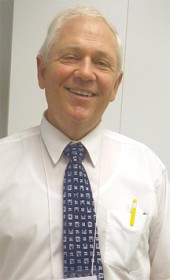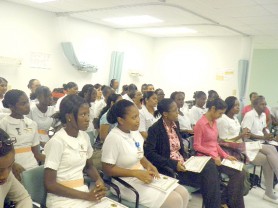US doctors with expertise in neo-natal resuscitation and newborn intensive care are here conducting training courses across the country, and the first batch of local health professionals was drawn from the Georgetown Public Hospital (GPH)
The Ministry of Health invited the humanitarian arm of the Church of Jesus Christ of Latter-Day Saints to conduct the course under the theme, “Helping Babies Breathe (HBB).” HBB is targeting recently-trained doctors, midwives and the nursing staff.
Dr Dennis Hughes, one of the team leaders, referred to HBB as an important programme, particularly in countries like Guyana where neo-natal mortality is high. At the end of September this year, GPH had recorded 106 neo-natal deaths in comparison to 97 for the corresponding period last year.
Hughes, an obstetrician and gynaecologist, estimated that 10 per cent of all babies born in this country are in some kind of trouble and of that number around 25 per cent die from asphyxia.
He said that with skilful hands, the right equipment and techniques, a healthcare professional in any country could revive and resuscitate a baby. “HBB is about teaching the right techniques using simple equipment… often many countries lack the resources and trained professionals to address problems such as resuscitating a baby,” Hughes explained. He said too that the programme offers hands-on training, adding that the equipment used is to be donated to local hospitals and clinics.
Some local doctors, including one based at Skeldon hospital, benefited from the training prior to the first scheduled course being conducted at Project Dawn, Liliendaal.
Forty-five persons were part of the first batch trained at Project Dawn during two days of intensive sessions.
According to Dr Hughes, the health ministry had also benefited from a similar course run by the church in 2005.
This year the team will also conduct training sessions at the West Demerara Regional Hospital as well as Suddie Hospital.
Stabroek News spoke with a few of the participants after the sessions ended last week, and Dr Farrah December, a Cuban-trained doctor, said the training was necessary.
She pointed out that the techniques were so basic, “anyone can do it after this session.”
December emphasized that Guyana needs to strengthen its pre-natal care programme, noting that the best healthcare services should be provided to newborn babies.
She said also that mothers need to be educated on how to take care of themselves, because “it helps in delivering a healthy baby.
“…These few easy steps can make a difference in a baby’s life so I urge everyone who has been trained here to go out and train others…I will pass this training on to my fellow colleagues,” she added.

Dr Aretha Alladdin Karan said the training will help to reduce infant mortality, noting that the first few minutes of a baby’s life are the most important.
She said that once the medical team gets the child to breathe then “so much more falls into place.”
President of the Midwives Association Maria Francois also benefited from the training and she praised it as not only timely but important as GPH improves on its neo-natal programme.
Francois said that she is aware of the criticisms facing nurses in the public health system, particularly at the public hospital.
According to her, some people forget what they had pledged to do.
Francois is a midwife and is regularly in the delivery room but she said she was off-duty when many of the recent cases occurred at the hospital.
She said that nursing is a professional job and this is what “nurses need to remember”.
Francois said that the HBB training served to reinforce what she had been taught. She said too that the focus should not always be on nurses because “the doctors have to step in as well.”

Registered Nurse Michelle Holder said the training has helped to refresh what she knew, but she pointed out that when people are not in a position to practice frequently “they forget steps.” She praised the approach taken by the instructors, saying that the course was well conducted.
Meanwhile, regarding the recent criticism and reports about the attitudes of some nurses at the hospital, Holder pointed to a lack of professionalism.
However, she said that some patients are not easy to deal with, but “you still try even in those difficult cases”. Holder also observed that many maternal and neo-natal deaths are preventable.
HBB is an evidence-based educational programme to teach neonatal resuscitation technique in resource-limited areas. The church would send volunteer doctors and nurses to conduct the sessions.
Last year, training was conducted in 31 countries in Africa, Eastern Europe and the Caribbean.




